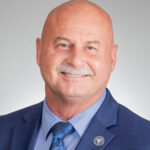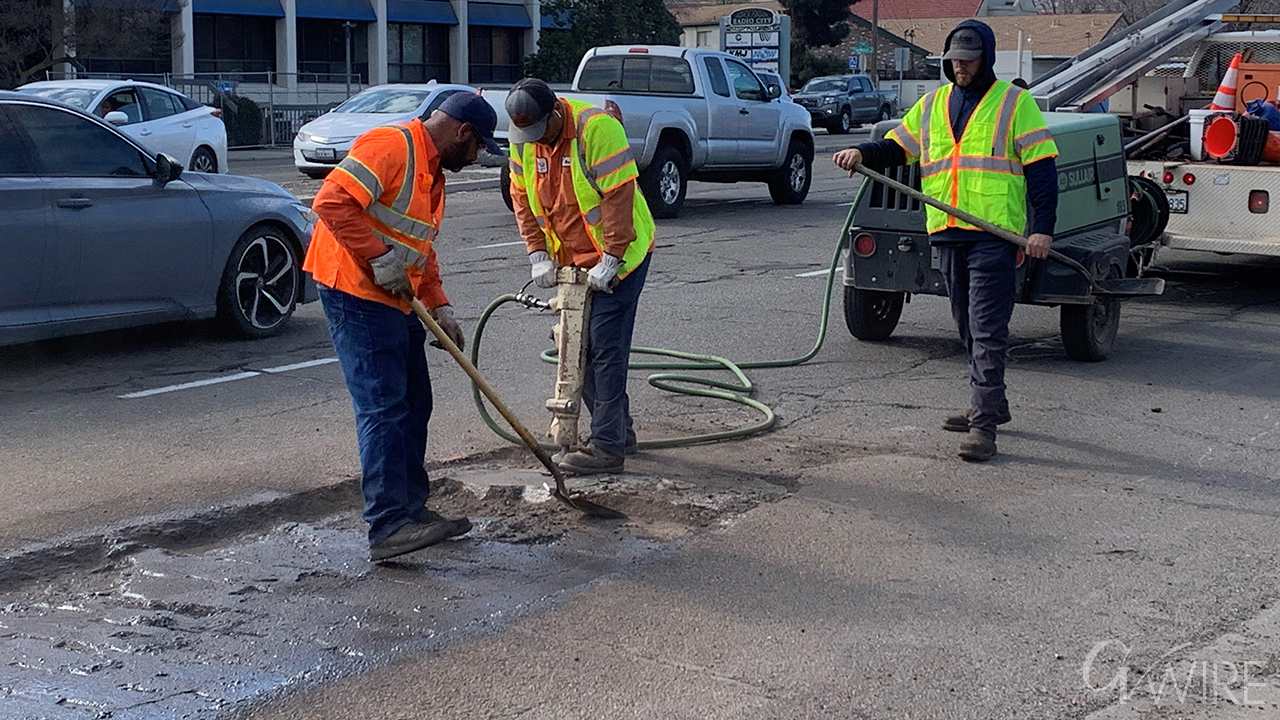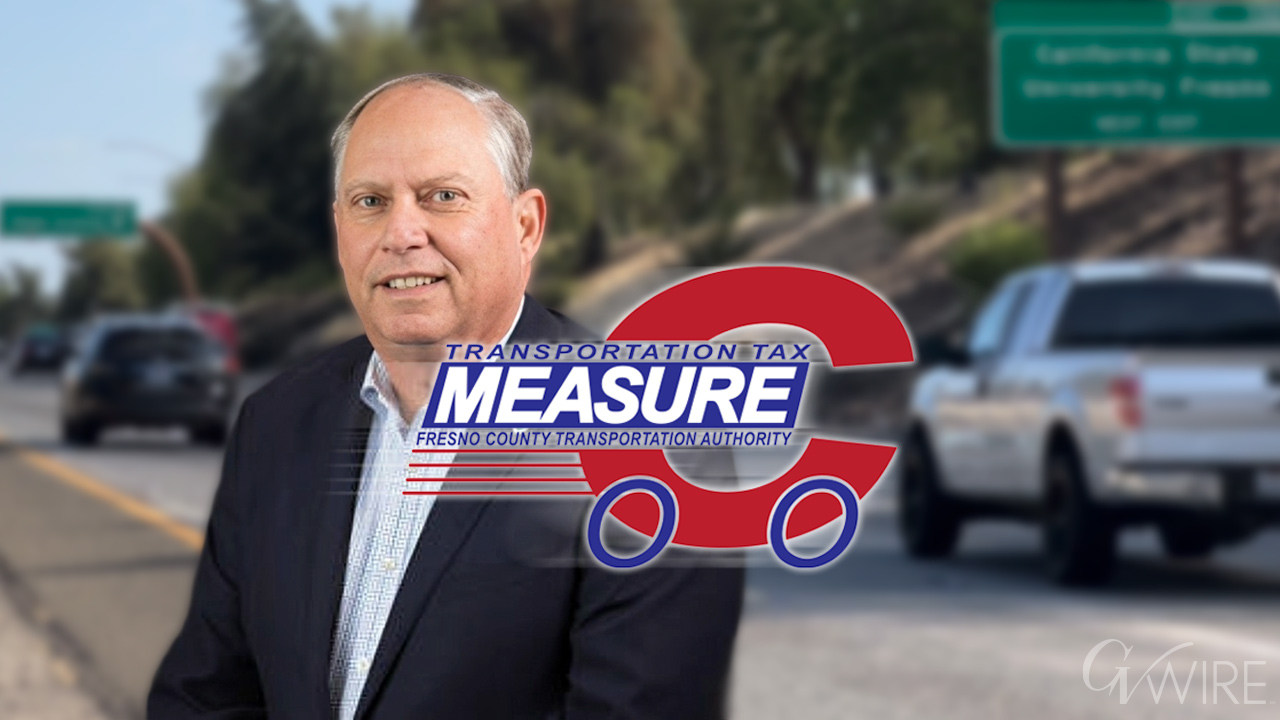Fresno County Board of Supervisors Chair Buddy Mendes said Fresno's political "jungle" is hard to navigate for an outsider after Fresno COG let its lead facilitator go in the midst of preparing a new transportation tax. (GV Wire Composite/Paul Marshall)

- Lead facilitator for Measure C, Kendall Flint, will no longer lead the consultation group for the Fresno Council of Governments.
- Fresno County Supervisor Buddy Mendes, who left the facilitation group, said Fresno's political "jungle" is hard to navigate.
- The COG will soon have to approve a plan for how much transportation tax money goes to roads versus public transit and pedestrian walkways.
Share
With the Fresno Council of Governments set to present a spending plan by September and billions of dollars at stake for local roads, the group is searching for a new Measure C consultant.
Consultant Kendall Flint of Oakland-based DKS Associates will no longer spearhead the research and data collection for the upcoming transportation sales tax renewal, Fresno COG Executive Director Robert Phipps told GV Wire. He said the decision was mutual between Flint and the organization.
Flint’s successor will face two big challenges, Phipps said.
No. 1, the new consultant will have to successfully navigate dozens of divergent interests — all with their own ideas on how the transportation tax money should be spent.
No. 2, he or she must fulfill Fresno COG’s goal of preventing a competing Measure C from going to the ballot.
Officials are looking at attorney and Fresno State professor Mark Keppler to navigate the many interests in how the half-cent sales tax should be spent, Phipps said.

“We’re attempting to bring different groups together, taking in the dynamics of personalities on the steering committee, the COG, the FCTA. It really requires I think someone who knows Fresno, the needs of Fresno.”
— Fresno Mayor Jerry Dyer
“He’s an attorney with a lot of mediation experience,” Phipps said. “With Kendall, I think that the board was just kind of unhappy with her presentations and I think some of her data interpretation. They didn’t see things the way that she did.”
Fresno County Supervisor Buddy Mendes, however, said Keppler’s board position on Tree Fresno presented a conflict of interest.
Flint declined to comment for this story. A call to Keppler was not returned. Fresno COG board chair Alma Beltran did not respond to calls or emails.
Mendes — who left the facilitation group in July — said Flint had become frustrated with the large number of people trying to control the process.
“Politics in Fresno is a jungle, and I don’t think she’s ever done jungle warfare,” Mendes said. “That’s everyone else’s fault for not helping her.”
Facilitators Will Have to Navigate Diverging Interests
Phipps said the change will not affect the timeline much. The plan is to have the council approve a spending plan by the end of September that voters will embrace.
Fresno COG will keep the contract with DKS and, if approved, Keppler will either work independently or through DKS. Flint will stay on in an advisory role.
As a facilitator, Flint conducted public outreach meetings and relayed feedback on spending plans to the county’s mayors. She additionally acted as the go-between for COG, the Fresno County Transportation Authority, and the Measure C Steering Committee — a 38-member group tasked with developing a Measure C spending plan.
Controversy arose with the 38-member group after coalition group Transportation 4 All — largely made up of groups previously opposed to Measure C — received nearly a third of the seats on the committee.
Fresno Mayor Jerry Dyer said the council needs a consultant with local voice who understands the different interests.
“We’re attempting to bring different groups together, taking in the dynamics of personalities on the steering committee, the COG, the FCTA,” Dyer told GV Wire. “It really requires I think someone who knows Fresno, the needs of Fresno… Unfortunately, I’m not sure that the DKS facilitator really had the intimate knowledge that was required to be as successful as we would like collectively.”

Preliminary Data Shows 46% of Funds for Roads. ‘Not Statistically Valid,’ Says Phipps
Ultimately, the council of governments will have to approve a spending plan they believe voters will approve. In July, Fresnoland reported preliminary feedback showing county residents wanting 46% of funds going to street and road maintenance, with the second highest allocation, 19%, for bike and pedestrian networks.
When COG gave Transportation 4 All the 12 seats, it also agreed to data sharing. The groups, many of which have long advocated for more public transit, have hosted many community meetings. A call to Andy Levine, spokesperson for the group, was not returned.
Phipps, however, said that the 46% figure was preliminary and not “statistically valid.”

“They got bamboozled. I don’t think anyone bothered to do the math when they let the 12 apostles in.”
— Fresno County Supervisor Buddy Mendes
“We never advertised it as such. We’ve got an online poll, we have done door-to-door canvassing, we’ve done community workshops, we had social media; people have had numerous ways in which to contribute to this process,” Phipps said. “But all along, it’s never been statistically valid because it’s not random.”
Phipps said the group is developing a more random method to get community feedback on how Measure C money should be spent. A draft poll will be completed by the end of the month.
Fresno Has $1 Billion in Deferred Road Maintenance. County Has $600 Million
Phipps said determining how much is spent on roads versus transit or other uses is a balancing act. It has to satisfy county mayors and potential third parties who want to create their own transportation tax measure.
With more than a billion dollars in deferred road maintenance throughout the city, Dyer called the 46% a “nonstarter.” He also said those premature numbers should not have been released.
“I’m still optimistic that we can work toward a measure that is good for all of Fresno County and will address the deferred maintenance on our roads that we all experience whether it’s the city or the county level,” Dyer said. “But it’s an absolute imperative that we get a transportation measure passed. If we don’t, our deferred maintenance is only going to grow.”
Mendes provided a rough estimate of at least $600 million needed in road repairs throughout the county. He said Fresno County has the most non-urban road miles in the state. He said to get Measure C passed, the plan would have to call for at least 80% spent on roads. The Measure C expiring at the end of 2026 distributes about 65% for roads, he said.
He told GV Wire a good plan would start with a baseline, around $200,000 annually for small cities, and then be divided up based on a percentage.
Mendes — who has been involved with Measure C since its first renewal in 2006 — said he left the facilitation committee in July after no one took his advice. He said the group did not negotiate hard enough with Transportation 4 All, acquiescing to compacted timelines — going from November to September for an announced plan — and giving the group 12 seats.
“They got bamboozled,” Mendes said. “I don’t think anyone bothered to do any math when they let the 12 apostles in.”
RELATED TOPICS:
Categories

Iran Retaliates Against Israel and US Allies



















